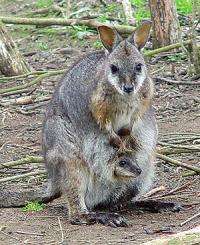Australian mammals take on antibiotic-resistant bugs

The Australian wallaby and platypus could turn out to be key weapons in fighting the growing health threat of multidrug-resistant bacteria, a team involving University of Sydney researchers has discovered.
In collaboration with the Victorian Department of Primary Industries and the University of Melbourne, they discovered molecules from wallaby and platypus young are highly effective at killing a range of bugs.
"These molecules may hold the key for the development of novel drugs to combat multidrug-resistant bacteria," postdoctoral researcher Dr. Emily Wong from the University of Sydney's Faculty of Veterinary Science said.
Antimicrobial resistance is a large threat to our health and current antibiotics are in danger of becoming ineffective as bacteria evolve to resist them.
"Australian mammals are a potential source of new antimicrobials. We have identified 14 antimicrobial genes from the tammar wallaby and eight in the platypus," Dr. Wong said.
"These mammals give birth to immature young that don't have a fully functioning immune system. To survive in their bacterial-rich environment, they rely on antimicrobials produced by the mother and delivered through the mother's milk, as well as producing them themselves," explained Dr. Wong.
The research, which was published for this first time this week, involved testing 19 multidrug-resistant microorganisms that are resistant to at least three antibiotics.
"One wallaby antimicrobial in particular is very potent against multidrug-resistant bacteria, including Pseudomonas aeruginosa, Klebsiella pneumoniae and Acinetobacter baumannii- superbugs found in hospitals which are dangerous and even life-threatening to people with compromised immune systems," senior author Associate Professor Kathy Belov said.
"Australian mammals are an untapped source of novel therapeutics. Antimicrobials that protect newborn wallabies may one day protect us from emerging superbugs," commented Dr. Belov.
In future work, Professor Ben Cocks from the Victorian Department of Primary Industries is interested in the possibility of using computers and synthetic biology techniques to uncover new antimicrobial sequences including ancient marsupial antimicrobials.
More information: The paper, 'Ancient Antimicrobial Peptides Kill Antibiotic-Resistant Pathogens: Australian Mammals Provide New Options', was published this week in PLosOne.
Provided by University of Sydney

















